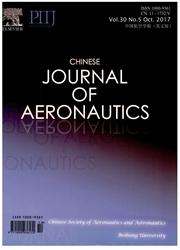

 中文摘要:
中文摘要:
这份报纸调查增加阶段与戳向量控制装备的一枚弹道的导弹的纵的自动驾驶仪。存在纵的自动驾驶仪采用时间不变的被动 resistor-inductor-capacitor (RLC ) 作为控制策略联网赔偿者,它不考虑变化时间的导弹动力学。这可以面对大骚乱和动力学无常引起靠近环的系统不稳定性。因此,存在控制器应该被重新设计完成更稳定的车辆反应。在这份报纸,基于安排获得的适应控制策略,最佳的控制器的二种不同类型被建议。第一个控制器与致动器限制是安排获得的最佳的 tuning-proportional-integral-derivative (PID ) ,它供应更好的反应,但是要求系统动力学的 priori 知识。而且,控制器面对动态无常有摆动的反应。考虑这,安排获得最佳线性二次(LQ ) 面对动态无常和大骚乱为控制器改进与最佳的调子赔偿者一起提供最大的范围。后者控制器为真实弹道的导弹系统的验证非线性的动态飞行模型通过各种各样的情形被测试,自动驾驶仪暴露了到外部骚乱。
 英文摘要:
英文摘要:
This paper investigates the boost phase's longitudinal autopilot of a ballistic missile equipped with thrust vector control. The existing longitudinal autopilot employs time-invariant passive resistor-inductor-capacitor (RLC) network compensator as a control strategy, which does not take into account the time-varying missile dynamics. This may cause the closed-loop system instability in the presence of large disturbance and dynamics uncertainty. Therefore, the existing controller should be redesigned to achieve more stable vehicle response. In this paper, based on gain-scheduling adaptive control strategy, two different types of optimal controllers are proposed. The first controller is gain-scheduled optimal tuning-proportional-integral-derivative (PID) with actuator constraints, which supplies better response but requires a priori knowledge of the system dynamics. Moreover, the controller has oscillatory response in the presence of dynamic uncertainty. Taking this into account, gain-scheduled optimal linear quadratic (LQ) in conjunction with optimal tuning-compensator offers the greatest scope for controller improvement in the presence of dynamic uncertainty and large disturbance. The latter controller is tested through various scenarios for the validated nonlinear dynamic flight model of the real ballistic missile system with autopilot exposed to external disturbances.
 同期刊论文项目
同期刊论文项目
 同项目期刊论文
同项目期刊论文
 Output Tracking for Nonlinear Non-minimum Phase Systems with Output Delay and Application to F-16 Je
Output Tracking for Nonlinear Non-minimum Phase Systems with Output Delay and Application to F-16 Je 期刊信息
期刊信息
